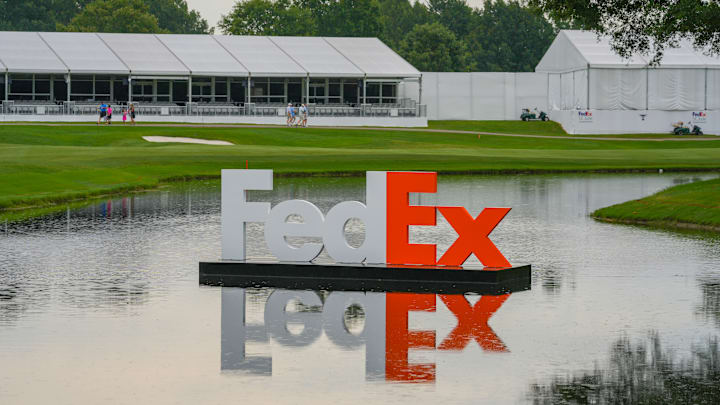Fred Smith, the founder of Federal Express, passed away over the weekend at the age of 80. He was a legend in business, founding FedEx in 1971 and building it into a worldwide delivery empire.
Smith's passing made me sad because I wrote what were probably the first Federal Express corporate identity manuals decades ago, giving me a small but personal connection with the company. That has nothing to do with the PGA Tour or the Memphis tournament, but I wanted to share it nonetheless.
From the standpoint of the PGA Tour, FedEx is obviously behind the massive FedEx Cup points and money program. Now that Smith is gone, will the program continue? Will the Tour event continue?
The answer to the second question is probably easier than the first, as the Memphis event is likely to go on as long as there is a St. Jude Children’s Hospital. The reason for that goes back to the man who raised the money to build and support the hospital itself, Danny Thomas, best known for his TV program Make Room for Daddy, which aired from 1953 to 1965. That’s an eternity in television. More on his efforts later. Now, back to the golf sponsorship.
The current contract between the PGA Tour and FedEx, whose partnership began roughly four decades ago, was signed in 2017 and is set to expire in 2027.
This situation, while different in several respects, reminded me of the Nabisco sponsorship on the PGA Tour in the 1980s and 1990s.
Ross Johnson, then CEO of RJR Nabisco, liked golf as a hospitality mechanism for customers who bought Nabisco cookies and crackers, as well as cigarettes. (The RJR stands for R.J. Reynolds, a tobacco company.) The cookies and crackers brand sponsored the Nabisco Dinah Shore on the LPGA Tour.
On the PGA Tour, Nabisco sponsored a huge (at the time) bonus pool for the top 30 players as well as the Tour Championship. They also provided some charitable donations and sponsored the statistical categories when players received compensation for being at the top in areas such as longest driving average, fewest putts per round average, and so forth.
On the senior circuit, Vantage cigarettes were the umbrella sponsor. That involvement included a season-long points competition called the Vantage Cup, as well as sponsorship of the first $1 million tournament on the senior tour, known as the Vantage Championship. There was also a Super Seniors competition for those over 60. And there was an electronic scoreboard sponsorship.
RJR Nabisco was eventually taken over by KKR in what was called a leveraged buyout or hostile takeover. The whole situation was so infamous and contentious that a book and movie were made about it, both called Barbarians at The Gate.
When KKR took over, they withdrew all the RJR Nabisco sponsorship money early. The cash departed the PGA Tour first, leaving the Tour without a sponsor for the Tour Championship. Then it left the Champions Tour.
Deane Beman, PGA Tour Commissioner at the time, vowed the Tour would never have a title sponsor for the Tour Championship ever again, as he didn’t want to be caught in that trap twice. To this day, there is a presenting sponsor in Coca-Cola, but there is no title sponsor.
The next company to step into this kind of a season-long framework was FedEx, which, in 2007, began the FedEx points program with the big carrot at the end of the season in the FedEx Cup and player bonus payouts based on year-long performance.
Contractually, as mentioned, they are currently obligated through 2027. But as KKR proved, a contract is not necessarily a contract. Skeptics would say maybe they had better lawyers or an escape clause.
Now back to the Memphis tournament. There was a professional golf tournament in Memphis beginning in 1958. It was called, quite simply, the Memphis Open. The first winner was Billy Maxwell.
And now, as promised, back to Danny Thomas.
Thomas’ success in his career allowed him to make good on a vow he made after attending a Mass early in his career while living in Detroit. He prayed for help in “finding his way in life,” promising that if he were successful, he would build a shrine to St. Jude Thaddeus, the saint of hopeless causes. Saints apparently like to have shrines because Thomas was successful both in his career and in building a lasting memorial.
In 1962, Thomas was present for the opening of St. Jude Children’s Hospital in Memphis. It was built with money raised by Thomas, his wife, and members of the American Lebanese Syrian Associated Charities. Beginning in 1970, money raised by what was renamed the Danny Thomas Memphis Classic helped fund the ongoing needs of the facility.
In the early years, the tournament was played at Colonial Country Club in Cordova (not the Colonial most think of), and it was there, in 1977, that Al Geiberger shot the first 59 on the PGA Tour.
In 1986, FedEx became the title sponsor of the event, and it became the FedEx St. Jude until the tournament technically folded in 2018, minus a four-year period from 2007 to 2010.
But the name didn't fold, as it was used for a trio of World Golf Championships at TPC Southwind from 2019 to 2021 and obviously continues to be used today, as the PGA Tour began holding the first event of the FedEx Cup Playoffs in Memphis in 2022.
So, no matter what happens with the umbrella FedEx sponsorship, the tournament would likely go on, with or without FedEx, although it’s a perfect match with FedEx being headquartered in Memphis.
And the season-long program, which FedEx has so generously funded, could eventually be picked up by another sponsor if FedEx wants out. But it might not happen absolutely, positively, overnight.
